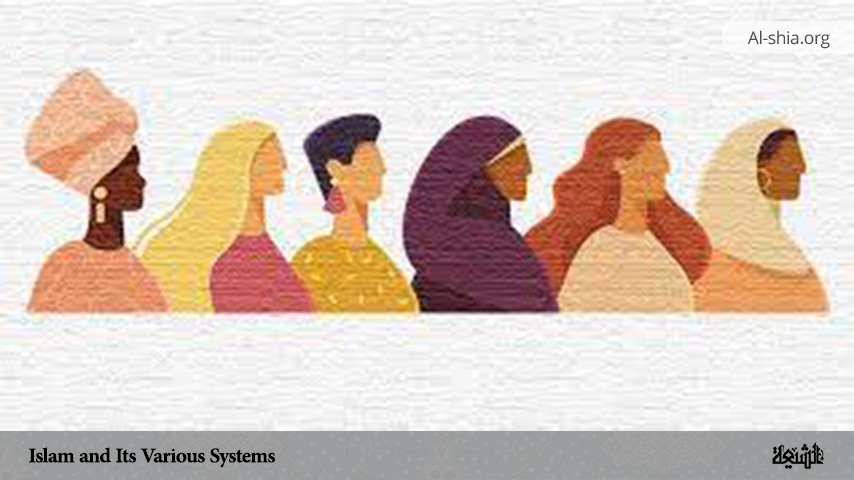Islam is a comprehensive way of life, which is meant for all people, irrespective of their races, languages or geographical locations. All people daily deal with social, political, judicial and economic issues throughout their life. So, Islam is sent to manage these aspects of people’s lives through various plans which are arranged in Islam’s different systems.
The present article aims to give a brief introduction concerning different Islam systems and answer how Islam manages people’s lives in the fore-mentioned issues.
SOCIAL SYSTEM OF ISLAM
Islam is a social message which aims to set up a close-knit and cooperative society in which all people enjoy equal rights and duties, and they are mutually bound through the bonds of love, respect and cooperation. Islam also cares for social relations between the family and society and considers the family as the basic unit of the social structure.
Formation of the Family
The family is held in Islam as the key unit in building society. That is why Islam pays great attention to making and organising the relationships between husband and wife, children and parents. Such ties are based on love, mercy and mutual respect. Prophet Muhammad, peace be upon him and his progeny, said:
“Never is anything built in Islam dearer to Allah, the Most Powerful and Glorified, than marriage.” (1)
He also said:
“Whoever gets married, he secures half of his religion. Then let him guard against evil in respect to the second half.” (2)
And so Islam settles the relationship between the husband and wife on the bases of love and reciprocal respect. Islam makes the husband shoulder the full responsibility of securing food, clothing, shelter, health care, etc. in proportion to his financial ability.
As Islam urges the connection between the husband and wife to be strengthened, it establishes moral and lawful ties between parents and their children. It is narrated from the Apostle of Allah that he said:
“An affectionate look by a son toward his parents is as worship to Allah”. (3)
Islam orders parents to love their children, be kind to them, foster them in an upright manner and secure what they are in need of. The Prophet is reported to have said:
“Love the children and have mercy on them. If you promise them something, then fulfil your promise. They know only that you are the one who secures their provision.”
As the parents are duty bound to spend on their children, the children should, as they grow up and their parents become infirm and helpless, spend on their parents.
Neighbour’s Rights
To bind the family strongly to other families and establish relations among members of society on firm and stable grounds, Islam exhorts Muslims to have good ties with their neighbours and to respect their rights. The Prophet of Allah is reported to have said:
“Gabriel recommended the neighbour so much that I thought he would leave an inheritance to him”. (4)
Also, concerning the neighbour, Prophet Muhammad has said:
“Whoever believes in Allah and the Last Day should never trouble his neighbour”. (5)
ISLAM POLITICAL SYSTEM
Islam has set exact and precise laws for society in every domain, politically, economically, judicially, militarily, etc. With respect to politics and rule, Almighty Allah in Holy Quran says:
“Indeed Allah commands you to deliver the trusts to their [rightful] owners, and to judge with fairness when you judge between people…”. (6)
Herein political justice is established, the responsibility of the state to the community is elucidated, and Islam made the principle of consultation a right of the Muslims. It is an obligation on the part of Muslims to obey legitimate authority based on religion, rights and justice. Islam makes the task of establishing and maintaining the social order and the state a general responsibility of all the people.
There is nothing of those limitations other religions approve of being placed between Allah’s rights and Caesar’s. The whole society should manage its affairs according to divine law. People are bound to make their life better and oppose corruption. Regarding this duty, it is reported that the Apostle of Allah has said:
“Whoever sees evil, he should change it by his hand. If he cannot, then by word, if he cannot, then by condemning it in his heart and that is the weakest form of faith.”.
Aiding oppressors is strictly forbidden in Islam and is considered a terrible crime. Injustice should be opposed so that justice prevails. In this way, the relationship between the authorities and the community is distinctly clear. Islam’s theory on politics and rule is based on the principles of justice, consultation, obedience, the right to criticize and reckon and mutual advice passed between the authorities and the people.
ECONOMIC SYSTEM
Islam recognizes individual property, public property and the property of the state. Usury, monopoly, and capitalist dominance are strongly forbidden. In earning their living, people are on the same footing.
The right of ownership is based on work and diligence. In Islam, the problem of poverty is dealt with through the laws of Zakat (poor tax), Khums (1/5 of surplus property; a yearly tax given to the Islamic Leader) and expiation. The government is obliged to secure the needs of any disabled Muslim. These measures are taken for the purpose of sorting out human economic problems and achieving social justice.
JUDICIAL SYSTEM
In Islam, the judiciary is one of the state’s responsibilities. Islam establishes rights and justice. One is innocent until it is confirmed by evidence that he is guilty. No innocent person is to be punished for something another person has done. Laws are set as the judiciary is one base of the bases to protect society.
NOTES:
——————————–
- Bihar- al- Anwar. Vol. 103, P.219, Hadith.13.
- Noor- al- Thaqalain, Vol.3, p.596.
- Bihar-al-Anwar, Vol.72, P.80.
- Bihar-al-Anwar, Vol.74, P.151.
- Al-Kafi, Vol.4, P.491.
- Quran 4:58.

















